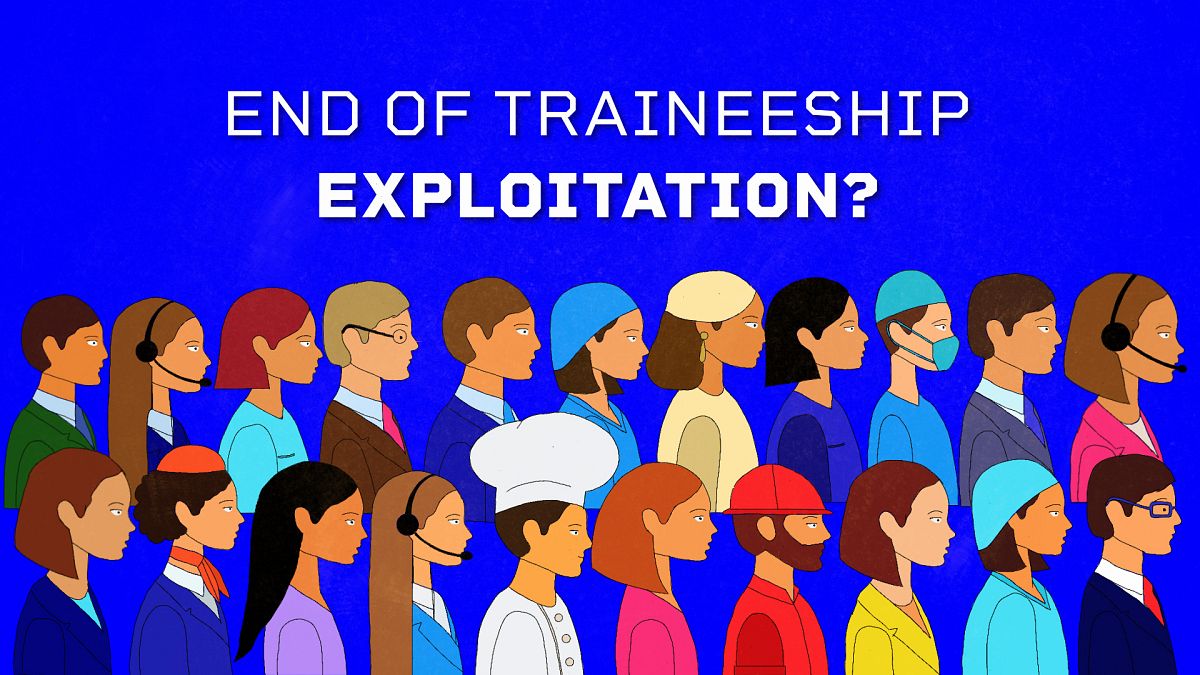In this episode, we focus on a directive on unpaid internships that aims to end the exploitation of around 1.5 million young Europeans.
There are more than three million trainees in the EU working on temporary contracts and almost half of them are unpaid. The European Commission proposed a new type of “quality internship” in March 2024 that would offer fair pay, pension protection and equal access for vulnerable groups.
However, the 27 EU governments failed to reach a consensus on the proposal in December and it will come under negotiation again in 2025. The EU cannot impose legally binding legislation banning unpaid internships, as this is an area of national competence, but the European Commission has promised to improve the current stalled text.
“We have a gap not just in the workforce but also in skills. We also have huge youth unemployment. So obviously we are relying heavily on the quality of internships to attract them into the job market,” Executive Vice-President Roxana Mînzatu told Euronews’ Decoded.
“We have to work with member states and I am sure they understand that the quality of internships, the minimum standards that we want to impose on internships across Europe are in the best interests of those countries, their industries and economies,” she added.
On average, 78% of young Europeans have completed at least one internship, according to the 2023 Eurobarometer. A fifth of them choose to do their internships in a different EU member state. In Germany, France and the Netherlands, up to 90% of young people do internships. In Malta, the Czech Republic and Sweden, a smaller proportion takes them up.
“Countries like Spain and Germany, for example, think that this proposal doesn’t work as it is written now, that it could lead to a race to the bottom because we are prioritizing low prices over the need to promote education. But others, like the Baltic countries or the Nordic countries, say the opposite, that the text works as it is,” said Paola Soler, who covers the issue for Euronews.
How many interns will actually be protected?
The European Youth Forum, trade unions and some members of the European Parliament have pointed out that around three-quarters of trainees may not be covered by this directive, as the current draft says it will only apply to open market positions.
This means that fair remuneration and social security protection would not apply to interns who were hired for work experience linked to an educational curriculum (e.g. to complete a degree), nor linked to the active labour market policies implemented by governments or linked to professional training.
“A quarter would be really unacceptable for the young people who asked for this legislative protection, they asked during the Europe Conference and the European Parliament asked too. So we need to think that if we make legislation we do it to really offer the younger generation protection and fair remuneration for their work,” Commissioner Minzatu added.
Average youth unemployment in the EU is 14.9%, more than double the rate for the general population. However, when youths get their first job as an intern, they can become trapped in that role for years.
“I think there should be regulation and not only in the monetary issue, but also that there is a structure, a third party, that supervises to make sure that it is really a good internship. Furthermore, there are also many cases in European institutions. My sister, for example, who is doing internships after internships and who in the end doesn’t find work, despite having experience,” a student with the Free University of Brussels told Decoded.
The Polish presidency of the Council of the EU will try, in the first half of the year, to advance the discussion, so that negotiations with the European Parliament and the European Commission can be resumed to reach an agreement on a final text. Will the EU succeed in its attempt to set minimum standards for interns in 2025? The jury’s still out!
Watch the video here!
Journalist: Isabel Marques da Silva
Production: Pilar Montero López
Video production: Zacharia Vigneron
Graphism: Loredana Dumitru
Editorial coordination: Ana Lázaro Bosch and Jeremy Fleming-Jones
Read the full article here


